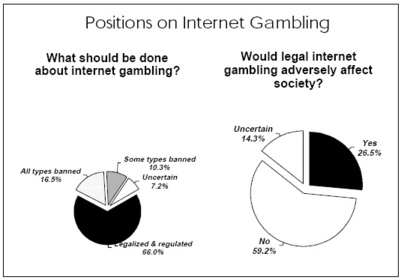The WAGER, Vol. 2(44) – Perceptions of internet gambling
Internet gambling continues to be one of the several controversial internet areas on which the U.S. government is clarifying its position. This week, a Senate committee approved the “Kyl bill”, thereby sending it to the Senate for consideration*. The Kyl bill, proposed by Senator Jon Kyl of Arizona, is based on recommendations from the National Association of Attorney Generals working committee. One component of this bill, if passed, would provide penalties for operators of illegal internet gambling sites of fines up to $20,000 or the value of the total wagers placed (whichever is greater) and as many as four years in prison. The bill also would fine internet gamblers up to $2,500 and six months in jail. The Kyl bill includes components detailing policing of internet gambling; for example, an internet service provider would have to terminate service to an offending individual if requested to do so by the U.S. attorney general or state attorney general**. In addition, federal injunctions would allow sites to be shut down. While the Senate is deciding the appropriate nature and degree of government regulation of internet gambling, the public is forming an opinion on the same issue. A recent MSNBC (Miscrosoft & NBC) survey on internet gambling questioned 1012 respondents on whether internet gambling was a diversion or a danger.3 Of the survey sample, 64% believed internet gambling should be legalized and regulated and 58% believed that internet gambling would not adversely affect society as a whole. In addition, 57% of respondents believed that if gambling on the internet was banned, internet service providers should not be required to police their lines for illegal content. This volunteer sample of internet users is not necessarily representative of Americans, however; future research on public perceptions of internet gambling and adverse consequences of internet gambling will inform government officials and the public alike on patterns in this new field.

Sources: *http://www.msnbc.com/news/119026.asp; **Cabot, A. (1997). The internet gambling report. Las Vegas: Trace Publications; 3http://www.msnbc.com/modules/FlexSurvey/gambling.asp?step=2.
This public education project is funded, in part, by The Andrews Foundation.